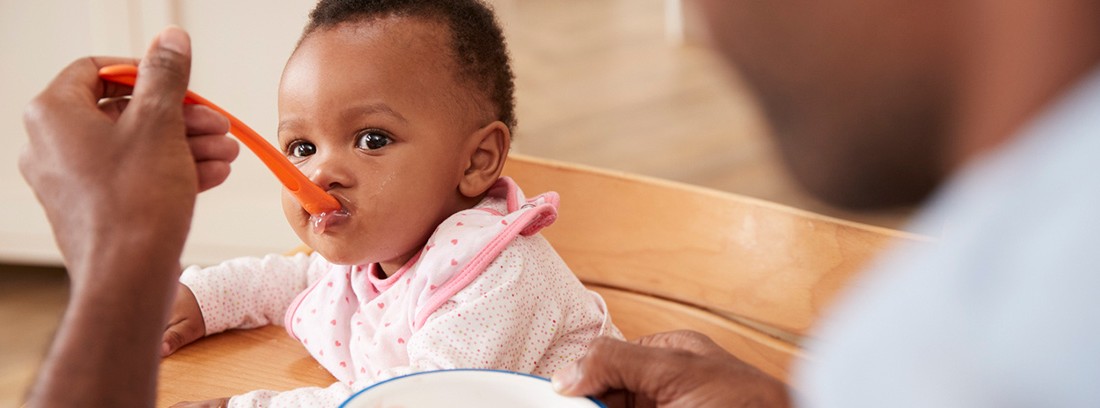How to prepare the baby for the new foods?

How the baby eats is one of the issues that matter most to parents, especially those who believe that their child eats little or refuses to eat.
"Eating is a pleasure"
The baby has to relate the food as something pleasant and pleasant and not as a moment of conflict or tension with the parents. Everything that the child experiences emotionally in relation to food can cause him to take a series of unhealthy attitudes when he is older. Having a positive attitude towards food and staying calm is very important
Food is not a reward or a punishment, it has the function of nourishing the baby and it should be a moment that is enjoyed as a family: it is a social act.
Autonomy
From six months it is recommended to seat the baby at the table with a suitable high chair and offer him food with a spoon. At seven months, many babies want to eat by themselves with the spoon or their hands, although at first they are not very right and they get lost. You have to let the child touch the food even if it gets stained.
Experimenting and manipulating food with your hands can make it more attractive and can aid in better acceptance. Always allow food to be handled carefully, a baby should never be left eating alone as there may be a risk of choking.
Between 15 and 18 months he already begins to eat hardly without help: he uses the spoon and drinks from a glass, he can begin to prick with the fork. The cutlery should be adapted to the age of the child, better made of plastic.
Even if they are older and eat, they should only be accompanied by an adult. The baby can be incorporated into the family routine, forming part of the table. Seating him to the table with the rest of the family (and without television) teaches the baby that food is an important and pleasant social act and, on the other hand, can encourage him to try the new foods that others eat.
The table is an example of educating in manners; at the beginning it is normal for everything to get dirty but, little by little, you have to correct small details. Parents are a fundamental role model, from them you learn that you have to eat everything and what manners to have at the table.
Routines and schedules
It is important to establish schedules and routines around food. Babies use a lot of energy and have low reserves, so they must eat very often. The meal schedule should be adapted to the rhythm of the baby.
When the child gets older, he can adapt to the rhythm of the adults whenever it is reasonable for him: breakfast, mid-morning, lunch, snack and dinner. You must sit at the table with the others.
The time to eat is also educated: neither scarce (that does not allow us to enjoy the social act of eating) nor excessive (more than one hour for each meal). A reasonable time would be between 30 and 45 minutes if the child already eats alone.
Baby's appetite and tastes
When milk is no longer the only food, the new flavors we offer your baby may or may not like. As he is a singular being and who is already beginning to express his tastes, he will express it by rejecting what he does not like (moving the spoon with his hand, spitting, closing his mouth ...). You have to give it time and be patient.
When this happens you should not give up, offering it every day, varying the proportions of the food in the porridge or giving the food separately (such as fruits), can help you accept them.
More important than quantity is the variety in the diet. Each child knows how much he needs to eat.
There will be days of everything: more appetite or less. We are never to force a child to eat, since one day you may be more listless or you may eat less because you are sick.
If the baby rejects the food, do not force it; there are children who eat less than others. If you grow well, gain weight, and look healthy at the pediatrician's check-ups, you are eating what you need.
You do not have to peck between meals or give the child sweet drinks, sweets, cookies or excess cow's milk that satisfies him and reaches the main meals without hunger. Between hours the baby has to drink water.
Sometimes it is convenient not to fill the plate to the top, it is better to eat less but varied: first, second and dessert.
To stimulate baby's appetite The dishes can be offered as attractive as possible, trying different textures (crushed, crushed with a fork or in pieces) depending on the child's teething, trying different proportions of food and cooking the same food in different ways (ex: grated apple , baked, in compote, in juice ...). In this way we can know which are the tastes and textures that most please the baby, educating his palate and encouraging him to eat everything.
Pediatric Specialist
(Updated at Apr 13 / 2024)